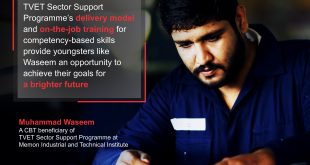Situated at a distance of around 70 kilometers from Punjab’s provincial headquarter Lahore, the district of Chunian is popularly known for two things: for being a textile hub and for being home to Pakistan’s biggest man-made forest, Changa Manga.But a fact not known to many is that this district also has a huge population of transgenders. In addition to the ones settled there, hundreds of thousands more gather in the village of Baharwal every year to celebrate their annual festival with great fervour.
In the mid of 2012, they found another reason to gather in this district.In a startling move, the Vocational Training Institute (VTI), Chunian, run by the Punjab Vocational Training Council (PVTC), announced a training course on industrial garments stitching, exclusively for transgenders. A similar course was also announced for deserving women living in and around Chunian district.
Being part of a marginalised segment of society, left to live on its own, the transgenders were overjoyed to know that somebody cared enough to lend a helping hand. But despite the excitement, it was not easy to convince the transgenders to enroll themselves in the class.
 “It took exhaustive sessions with their gurus (leaders of transgenders) to make them realise the utility of the training programme,” says Abdur Rehman, the principal of VTI Chunian. He explains that the ultimate goal of this programme is to train and enable transgenders to find jobs and that too in a high-demand profession such as industrial garments stitching.
“It took exhaustive sessions with their gurus (leaders of transgenders) to make them realise the utility of the training programme,” says Abdur Rehman, the principal of VTI Chunian. He explains that the ultimate goal of this programme is to train and enable transgenders to find jobs and that too in a high-demand profession such as industrial garments stitching.
Otherwise, he says they have to indulge in immoral activities or to depend on alms money to survive. Those who are good-looking and in the prime of their age are a bit better off, but the living conditions of the aged ones are deplorable. There is no support from the family and the society, he adds.Industrial garments stitching is a profession in great demand but the VTI could not launch this programme in the area earlier due to a lack of resources. The breakthrough came in the form of assistance from the Technical and Vocational Education and Training (TVET) Reform Support Programme. It is a multilateral initiative co-funded by the European Union (EU), the Royal Embassy of Netherlands and the Federal Republic of Germany. The programme is being implemented by the German development agency, GIZ, in close collaboration with public and private sector organisations.
 The funds required to buy the necessary equipment and uniforms for students and pay them stipends are managed under the Fund for Innovative Training (FIT), created under the same programme.
The funds required to buy the necessary equipment and uniforms for students and pay them stipends are managed under the Fund for Innovative Training (FIT), created under the same programme.
The VTI has 21 transgenders and 36 female students on its rolls. The class for women starts at 8 am in the morning and that for transgenders begins at 11 am. The reporting time has been relaxed for transgenders as it is not easy for them to find public transport early in the morning.When applications were invited, 40 transgenders applied. This success is attributed to the dedicated efforts of Liaquat alias Shama, who herself is a trainee and has strong connections with tailor masters working at nearby industrial units.
 She is also an inspiration for other transgender students of the class. For years, she has been visiting stitching units and getting work that can be done at home on a per piece basis. The students who are learning trades such as lock stitching, fabric cutting, pattern making, vacuum press and so on are counting on her a lot. “I am quite hopeful they will all find work the day they pass out,” she says.
She is also an inspiration for other transgender students of the class. For years, she has been visiting stitching units and getting work that can be done at home on a per piece basis. The students who are learning trades such as lock stitching, fabric cutting, pattern making, vacuum press and so on are counting on her a lot. “I am quite hopeful they will all find work the day they pass out,” she says.
The principal confirms that the trainees, whether they are transgenders or women, are all highly deserving and committed. He adds that those who were not serious were politely asked to leave.
Shaukat Ali is a shining example of someone who has taken up this training course with great enthusiasm. A transgender hailing from the village of Nathoki, Kot Radha Kishan, District Kasur, she was just 10 when signs of a change of gender began to appear in her body and her parents’ attitude towards her changed. Ultimately, she had to leave her family and work as sex worker to make a living.
Today, she is very happy to have found a light at the end of the tunnel. Having learnt to work on five different stitching machines, she says she is able to stitch dresses for both men and women. She is a step ahead of many others in the class as she is already running a small stitching center in her house and earning a healthy income.The stories of some of the female students at the VTI are no less touching. For example, Syeda Rubab Sarfaraz, 20, lives in Zaheer Abad Colony, Chunian. She is the eldest in her family and there are five brothers and two sisters younger than her and all of them are studying. Her father is a school teacher and with his small income he manages all the family expenses.

When she was younger, Rubab suffered from typhoid fever and her legs were semi-paralyzed. Her medical treatment consumes a considerable part of her family’s income. She is committed to this skill development initiative and hopes she will be able to contribute significantly to her family’s income once she passes the course.Rubab is already helping them out with the Rs. 2,000 she is getting as a stipend under this project (being funded by the TVET Reform Support Programme).
Then there is Rukhsana Kausar, 30, who is less than four feet in height and could not get married because of it. Her two sisters are of the same height and her father is a security guard in a school; his income is insufficient for supporting a family like theirs. Her mother stitches clothes for neighbours to supplement the family income. Rukhsana has worked hard to learn the skills of cutting and stitching and has started helping her mother at home.
“I am quite hopeful I’ll ge t a good job once I complete the course. It will also help me and my family come out of this vicious circle of poverty,” she concludes, adding, “Thanks to VTI, Chunian. Thanks to whoever is supporting this project.”
t a good job once I complete the course. It will also help me and my family come out of this vicious circle of poverty,” she concludes, adding, “Thanks to VTI, Chunian. Thanks to whoever is supporting this project.”
 Pakistan TVET REFORM Support Programme Technical and Vocational Education and Training (TVET) Reform support Programme
Pakistan TVET REFORM Support Programme Technical and Vocational Education and Training (TVET) Reform support Programme









